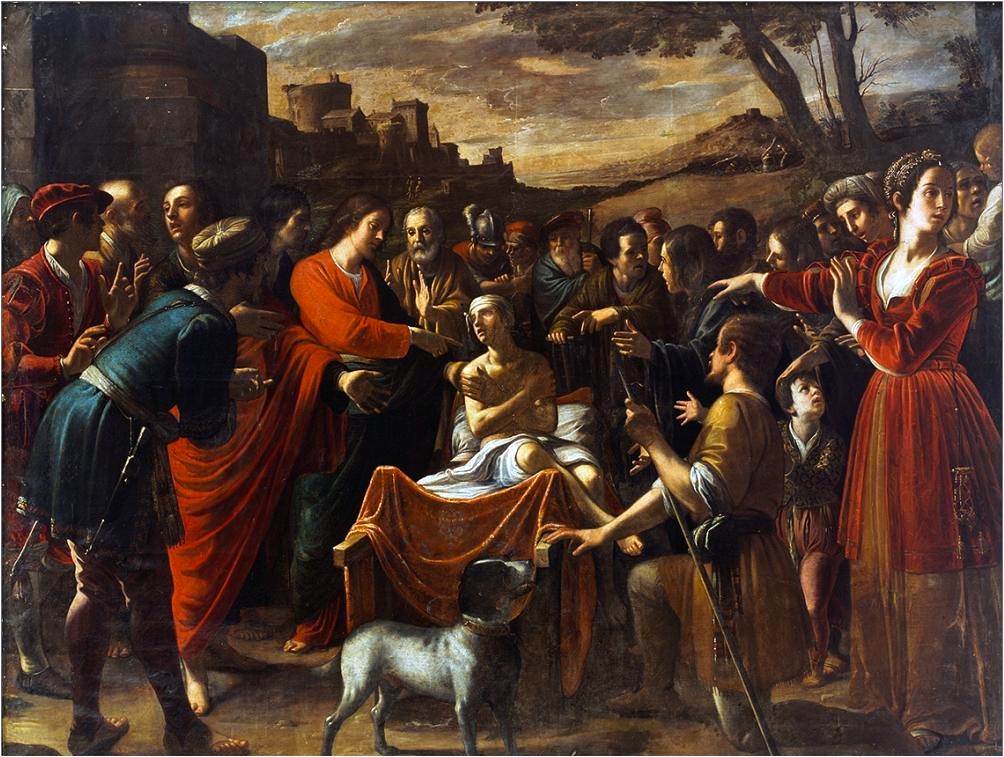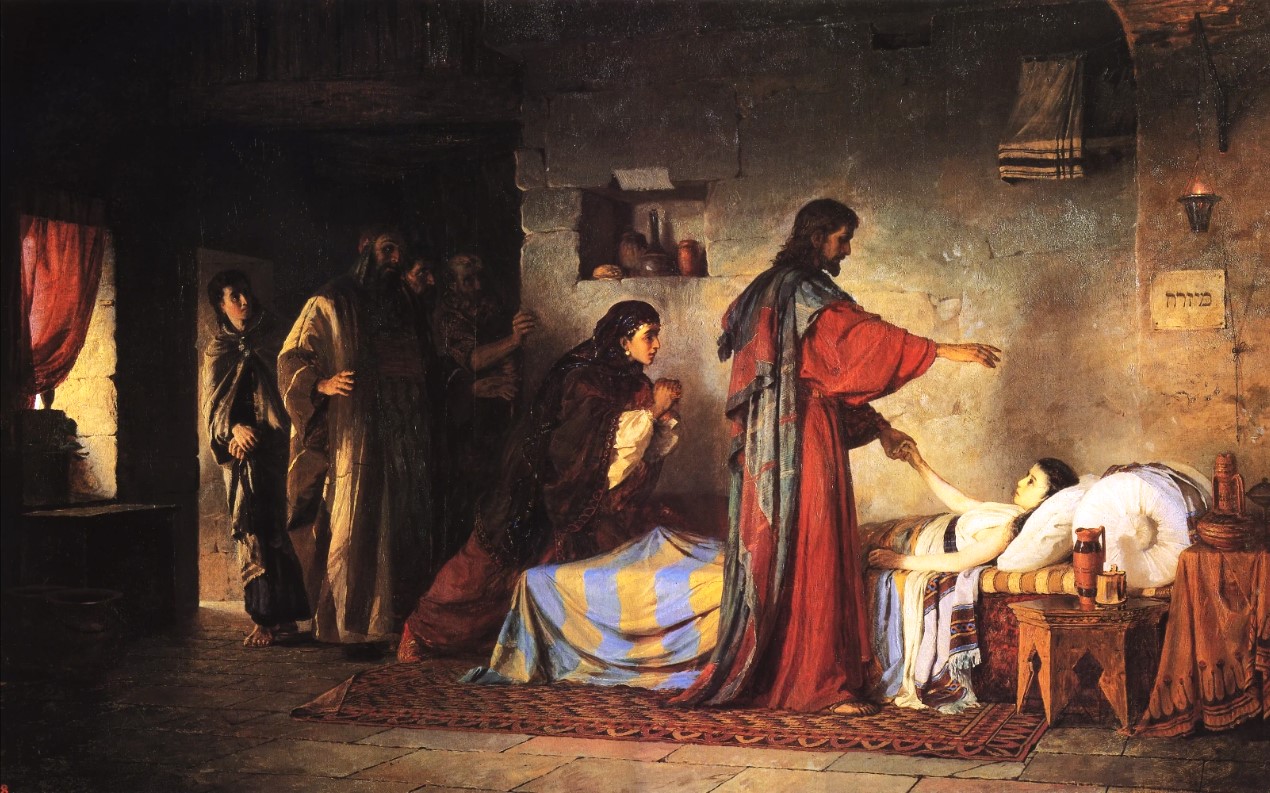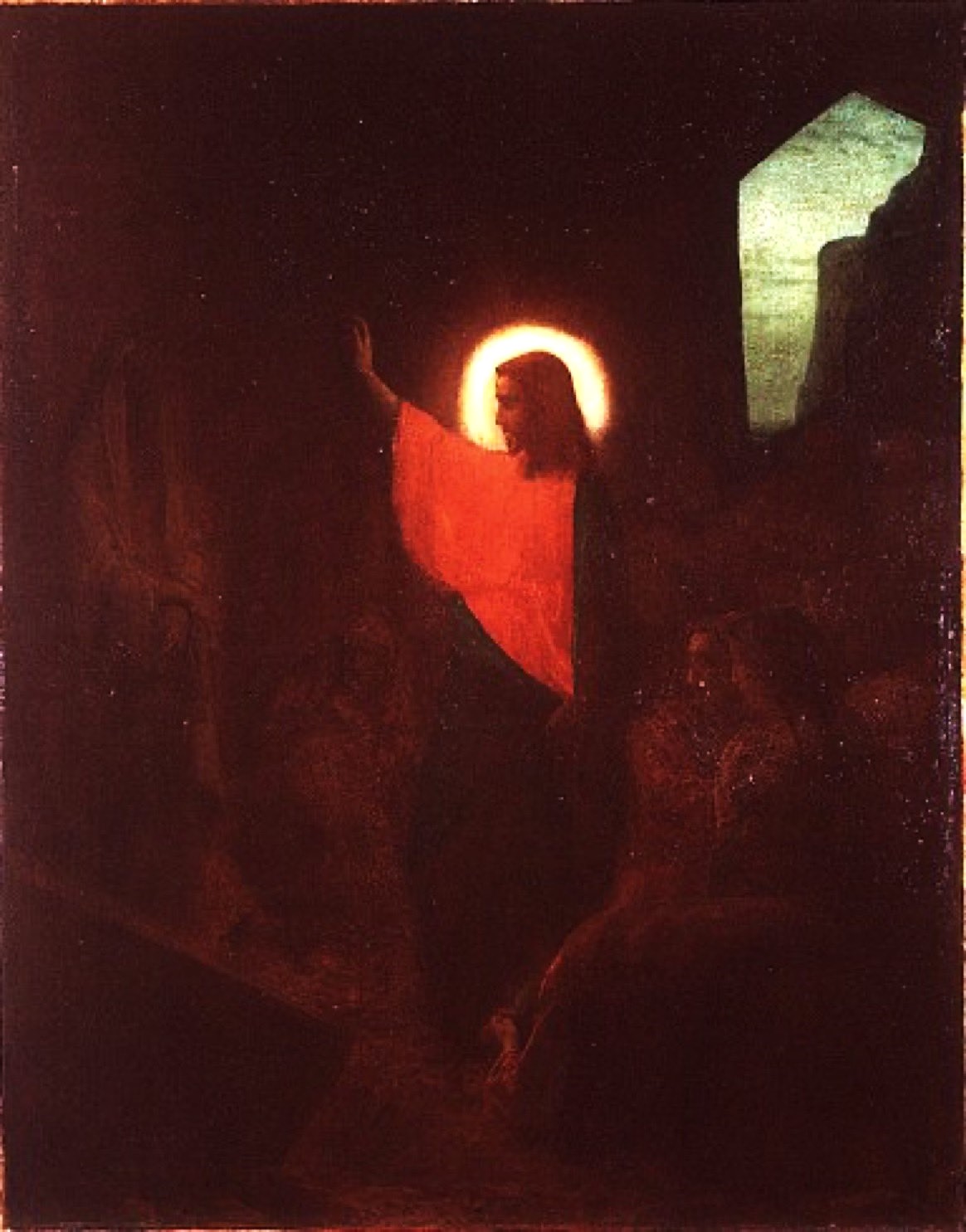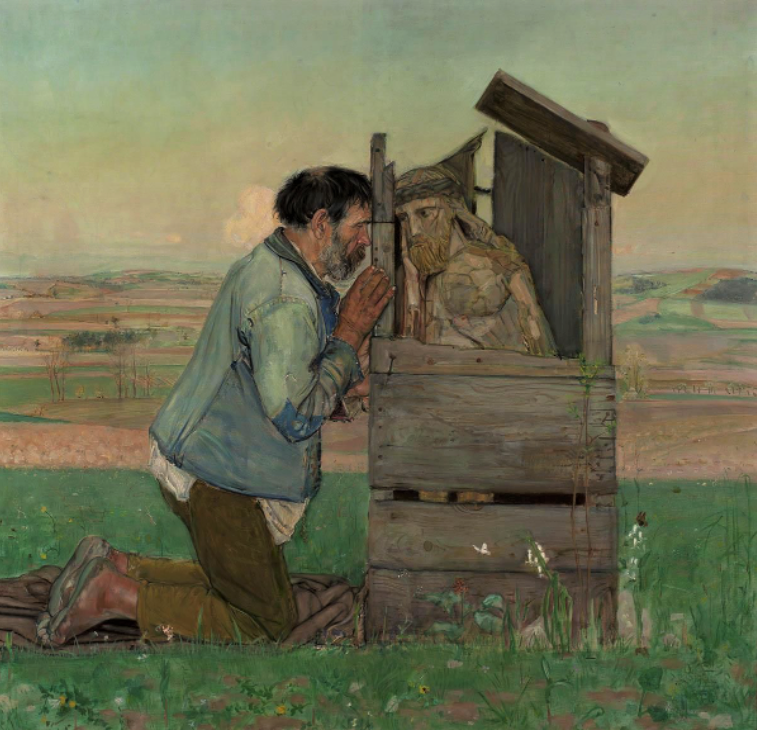
Miracle at Nain, Mario Minniti, c 1620

The Resurrection of Jairus’ Daughter, Vasily Polenov,1871

Lazarus Raised from the Dead, Charles Sellier, 1857
Transcription of Audio
Translation of the Epistle for the 15th Sunday after Pentecost.
Brethren, if we live in the spirit, let us also walk in the spirit. Let us not be made desirous of vain glory, provoking one another, envying one another. Brethren, and if a man be overtaken in any fault, you, who are spiritual, instruct such a one in the spirit of meekness, considering thyself, lest thou also be tempted. Bear ye another’s burdens, and so you shall fulfill the law of Christ. For if any man think himself to be something, whereas he is nothing, he deceives himself. But let everyone prove his own work, and so he shall have glory in himself only, and not in another. For everyone shall bear his own burden. And let him that is instructed in the word, communicate to him that instructs him, in all good things. Be not deceived, God is not mocked; for what things a man shall sow, those also will he reap. For he that sows in his flesh, of the flesh also shall reap corruption: but he that sows in the spirit, of the spirit shall reap life everlasting. And in doing good, let us not fail; for in due time we shall reap, not failing. Therefore, whilst we have time, let us work good to all men, but especially to those who are of the household of the faith.
Continuation of the Holy Gospel According to St. Luke.
At that time, Jesus went into a city called Naim: and there went with Him His disciples, and a great multitude. And when He came nigh to the gate of the city, behold a dead man was carried out, the only son of his mother, and she was a widow, and a great multitude of the city were with her. And when the Lord had seen her, He had compassion on her, and said to her: Weep not. And He came near and touched the bier. And they that carried it stood still. And He said: Young man, I say to thee, Arise. And he that was dead, sat up, and began to speak. And He delivered him to his mother. And there came a fear on them all: and they glorified God, saying: A great prophet is risen up among us, and God has visited His people.
The saving words of the Gospel.
In the name of the Father, and of the Son, the Holy Ghost, Amen.
God has visited His people.
This beautiful Gospel passage takes place in a town called Naim. Naim is Hebrew for beautiful or pleasant, that’s where we get the name Noemi. In fact, if you remember in the book of Ruth, her mother-in-law was named Noemi. And in a time of great distress, she’s uses this pun, this plan words, Don’t call me Naomi anymore. Call me Mara, which means bitterness because of the distress that had befallen her.
Well, they come upon this town that was probably situated in a beautiful place, hence the name. Christ is accompanied by His Apostles and many others who are listening to His every word; watching, learning, some are probably curious. And they come to the gates of the city. These Semitic towns are of interesting construction. These walled towns would have a road that would run alongside the outer wall. And then, it was almost like a candy cane where there was a very sharp curve. And as the road curves, the gate of the town is presented. And so, they were constructed this way so that the enemy couldn’t gain momentum in rushing the gates. And then as you turn this very sharp curve and are confronted with the gate. After the gate, there’s a throne. There’s a seat for a king or a governor who would inspect those who are coming into the town to see if he wants them in his walled city or not. And then, after you pass the test, you have passport and then you can enter the town. And then there’s a market and that’s where everybody sells their wares and are hawking their items. So this is where our Lord chooses to do this miracle of raising the dead young man; by a judgement throne and before the eyes of many.
He’s a young man. We heard in the Vulgate translation from Luke’s Greek adolescentulus, so he was somewhere between 15 and 40. And he’s the μονογενὴς, monogenēs, says Luke, μονογενὴς, monogenēs, so he is not only the only son but he is the only child. In other words, this widow is totally destitute. She has no husband. She has no child to take care of her. She is in great distress not only for her loss, but there’s no social network to help somebody in this situation. No doubt our Lord saw something of a preview of His own mother’s desolation with her loss of Him.
And a great multitude of the city was with her, which seems to indicate that she was a woman of good character and was very well respected. Whom when the Lord had seen being moved with mercy towards her, here we see this common dynamic of these two verbs; our Lord sees and then is moved. And this moved is an interesting Greek word, which has to do with the guts. In other words, He’s moved – it’s a visceral, physical reaction that He feels in His whole body the moment He sees suffering, the moment He sees sorrow. We can all distract ourselves. Take a nap. We can speak with friends. We can open the fridge or turn on the TV. Distract ourselves. Do whatever we can to try and forget about present sorrows. Our Lord doesn’t do that. He appropriates the sorrow that He sees perfectly, moreso than the one who suffers.
And so, when people say, You know why… How does God let me suffer this? Well, we ought to ask, What’s it like for you, Lord, to suffer this because You suffer more in Your members than we do ourselves? And He says, Weep not, and He comes near and He touches this bier, which He’s not allowed to do. He becomes unclean by Jewish law if He touches this, and nonetheless, He does. Instead of Him becoming unclean, The man receives new life. He sits up and he speaks; so signs not only of life but also the presence of the soul. The soul has reentered the body. And the proof of that is he speaks. The proof of rational life is speech. And so, what happens? Our Lord gives him another chance.
I always wonder what happened with this young man after this initial resurrection, what changed in his life? What were his priorities like? How did he use his time? What was important to him after this event, which no doubt changed his life? What effect did the Holy Name have on him every time he heard it? And this should be our story. It certainly is our story because each one of us has been raised from the dead in our Baptism. We, each one of us has been raised from the dead when we’ve been absolved in Confession. This is the story of each one of us. This is not merely an event from 2000 years ago.
When Augustine comments on this, he compares this raising of the dead with the little girl, tαλιθα κουμι, talitha koum, and Lazarus. One is still on her deathbed in the privacy and the discretion of her home. This young man is on his way to the cemetery. And Lazarus has already buried, and he has been buried for four days. Augustine says that these are symbols of our own spiritual experience, how our Lord forgives those secret sins of thought. Our Lord also forgives those open sins that are there for the public to see, those sins of action. And then those who, like Lazarus, he uses Lazarus as the symbol of habitual sin, those who are buried in sin, because they’re slaves to a vise. Nonetheless, all of us, all of them, are forgiven in as much as they submit to His Mercy. And so this is not simply an anecdote. This is not a story from 2000 years ago. It’s something we live in our own flesh and soul.
And so the question then, for us is: Once I’ve been raised from the dead, what effect does that have on me? With what sense of debt do I approach Christ in my prayer, in my Adoration, in Mass? Do I have a sense of one who is a debtor? And when I’ve been forgiven, what changed? What’s changed besides the forgiveness? In other words, what resolutions have I taken? There’s something almost… there’s something certainly sacrilegious but almost superstitious in this cycle we see in some souls where there’s the acceptance of sin, Confession, Communion, and it’s a cycle that doesn’t seem to get better. Sin, Confession, Communion, and then sin, Confession, Communion. This isn’t a healthy relationship to have. Once we’re forgiven, things should change. Once we’re forgiven, we are given not just forgiveness, which is an immense gift. Thomas Aquinas says that God’s Mercy is of greater value than the entire cosmos. So once I’ve received that, he also says that the forgiveness of one soul is greater than the creation of the entire universe. It’s a greater work and that Mercy is God’s greatest attribute.
So in light of that, what changes in me? In other words, what resolutions do I make? What in my attitude and my behavior, my whole thought process, changes? And so, this is the question that we ought to ask ourselves. But we ought not give the answer to ourselves but rather to our Lord, who has risen us all from the dead.
In the name of the Father, and of the Son, the Holy Ghost, Amen.

